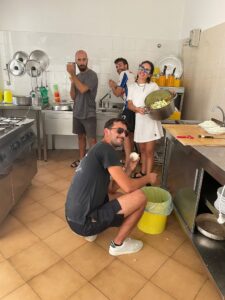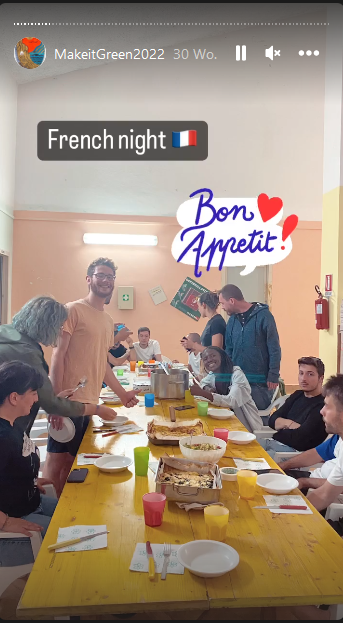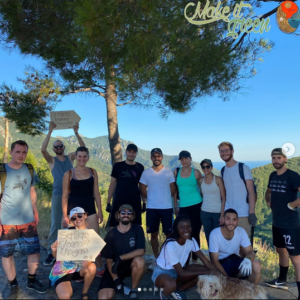Hello everyone, my name is Ahmed and I am the writer of this article. I am a person with different passions in life, but when I am in the kitchen, I enjoy myself the most, and this is the leading reason into writing this article.
Quick tip: In this article I will choose only the important things and the foods that are worth mentioning.
Energy Factory

It all started in a kitchen of a school in Gete, Tramonti, Italy, a small place of about 7 meters in length, 3 meters width, 6 gas burners, 4 refrigerators and a small food pantry. Lots of food, with fresh local fruits and vegetables and 16 people, spited in 4 teams that generally cooked following a schedule. However, dear readers, throughout this article you will get to know more about the food cooked during the intercultural nights that were made in the Energy Factory, where our participants amused us with amazing food from their country. Our international teams prepared the food from their country carefully with a lot of love and passion, so we could really experience the original traditional taste of these magical meals.
- French Night
On this night the following foods were served,
- Salade Niçoise (Salad with potatoes, green beans, eggs, lettuce, olives, tomatoes, tuna)
- Quiche Lorraine & Tarte Epinards Chevre (spinach, cheese and eggs quiche)
- French Crepes
- Hungarian night:
On this night the following foods were served,
- Gyümölcsleves (Fruit soup (with plums and peaches))
- Csirkepaprikás – krumplipüré (Chicken stew (made with paprika, tomato, oniond and the spice paprika) with mashed potatoes)
- Kekszszalámi (‘Cookie Salami’ sweet made with smashed cookies, cacao, coffee, butter, apricot marmalade, sugar)
- Turkish-Georgian night:
On this night the following foods were served.
- Kofte (fried potato balls)
- Khachapuri (cheese-filled bread (Georgian recipe))
- Turkish sweet
- Portuguese night:
On this night the following foods were served.
- Sopa de Legumes (Vegetables soup with potatoes, onions, zucchini, carrots, salt, season pepper, olive oil)
- Salada de Bacalhau (code fish salad with peppers, eggs, potatoes, onions, olives, salt, olive oil)
- Doce Da Casa (House sweet with condensed milk, cornstarch flour, eggs, cooking cream, sugar, maria cookies, coffee, milk, vanilla)
5. Arabian/Croatian/Spanish Night:
On this night the following foods were served.
Knedle Sa Sljivama.
- Maqlop
- Tapula (Salad)
- Tortilla
- Knedle Sa Sljivama
6. Greek night:
On this night the following foods were served,
- Κολοκυθοκεφτέδες με τζατζίκι (zucchini balls with tzatziki).
- Τυροκροκέτες (cheesballs)
- Σπανακοτυρόπιτα (Spanakotiropita-spinach and feta cheese pie)
- Μουσακάς (Musakas-minced meat eggplants, zucchini, potatoes and bechamel)
- Γιαούρτι με φρούτα κομπόστα, μέλι και καρύδια (Greek yogurt with fruit compost honey and walnuts)
- Italian night:
On this night the following foods were served,
- Pasta alla nerano (Pasta with garlic, zucchini, butter and basil leaves)
- Parmigiana di melanzane
- Peperoni In Agrodolce.
- Bruscheite Con Pomodori e con Funghi
- Tiramisu


After mentioning the menu of the international evenings, I will tell you about the lemon risotto, an amazing Italian dish that I had the pleasure of trying and I will also talk about cooking in general as an experience and learning process.
Lemon risotto, the name is simple, but the method of preparation differs from the name. During the preparation lemons must be squeezed in a pot with vegetables to be cooked with a low flame because we need a hot soup. In the pot where the rice is cooked must be added some extra virgin olive oil and here is where the real battle begins as you must keep stirring the rice until it is done. When the rice is done you can add the soup previously made, pouring a kitchen spoon every 30/60 seconds. After 3 minutes you can add lemon zest and then continue to do this until is ready! Regarding the soup (please do not put all the ingredients at once and think smart because in this case you will be dumber than a simple SpongeBob cartoon and the Italians will ban you forever). The secret of the taste is in the lemon zest (which can be added on top of the dish as well) and lemon juice. After you are done with the cooking, you can enjoy the wonderful flavor.
Love is one of the things that most people demand very much. The love of a certain person, the love of a certain thing, the love of a certain animal or the love of a certain food, but have you ever thought about loving the kitchen? The answer to most of you is no, I am sure of that. Take paper and a pen or your phone and write down these questions and answer them and keep the answers until we finish our tour in the world of our community cooking.
- Do you like math? You have to calculate the ingredients and the time.
- Do you want good health? Healthy food in your own way.
- Do you want to save some cash? It’s better to cook on your own than to buy it ready.
- Do you have a fear of too many calories? Control it by making it yourself.
- Do you like chemistry? You can use it in cooking.
- Do you like medicine? Herbs are an important type in cooking and also in medicine. If you did not know, most types of medicines have herbs in them.
And the most important question is, why is the kitchen and cooking so important??!*Because* Cooking is the art, science, and craft of using techniques and ingredients. They widely change around the world, from grilling food over a fire to using electric stoves, to baking in different types of ovens, reflecting unique environmental, economic, and cultural traditions and trends. The types of cooking also depend on the skill levels and training of the chef. Cooking is done by both people in their dorms and professional chefs in restaurants and other food establishments. Cooking can also occur through chemical reactions without the presence of heat. And when you learn the art of cooking, you will learn many things with it. I will tell you some of them and why you will learn them. I will explain everything to you so that you do not have to ask (what does this have to do with this?).
Organization:
Chefs must be very organized in the kitchen. They have to work on a variety of tasks keeping the kitchen clean and safe. They do this in the following ways:
- Commitment to quality Efficiency
- Kitchen safety
- Kitchen tools
- Multitasking
- Safety precautions in terms of food.
Attention to detail:
Cooking is a science. Every ingredient and measurement must be accurate, including cooking certain items so that they are all wrapped at the same time. The chef needs to pay attention to details such as:
- Heat control
- Measurement serving size
- Food quality check
Cleanliness:
Chefs need to know how to keep their kitchen clean and healthy. This is very important in a restaurant, where unsanitary conditions can affect the quality of the food and can occur in the end of business for a restaurant. Chefs are responsible to follow healthy and safety practices.
Creativity:
Working in the food industry requires creativity. Chefs should be open to incorporate new nutrients into menus as well as improving old recipes. Creativity and imagination will keep customers coming back for more. Chefs should be constantly implementing the following methods:
- Experimentation
- Menu design
- Presentation to the customer
Trial and error
Fast-paced decision making:
The kitchen is a fast-paced environment, and the chef has to make many decisions at once quickly and efficiently. He must be able to:
- Deal with pressure
- Solve problems
- Take initiative
Commercial intuition:
A good chef must also be good at running a business. You should always think about how to make delicious food while also being cost effective. Chefs often deal with the following tasks:
- Budget
- Commercial intelligence
- Commercial intuition
- Computer skills
- Theoretical thinking
- Labor cost control
- Cost control
- Reduce costs
- Customers service
- Food pricing
- Food Safety
- Food regulations
- Food Service
- Management recruitment
- Inventory Management
- Inventory turnover
- Kitchen management
- Food selection
You make people happy: People love to eat out, so whether you’re helping make a special occasion happier or eating a more delicious lunch, it’s good to know that your every day is a new experience: Although there are routines in every kitchen, every day creates so many possibilities to break the daily routine and try something new. It can either be a special event or a special menu.
Be part of a family: The kitchen is a close family, and chefs spend hours working with each other and communicating with colleagues. This creates a close relationship that can lead to strong teams and a positive work environment.
Respect title: Chefs are respected and often find themselves asked for advice on a recipe, a technique, and anything related to the culinary arts. Sharing this knowledge is a great way to make new friends, impress your neighbors, and create opportunities for socializing.
It is an industrial growth function: People will always want to eat out and as the food industry grows steadily year after year, there will be many new and challenging jobs offers.
This is not all, there is, but the idea that I want to convey is that cooking is another world, it is true love, and it is one of the things that we consume daily and in very large quantities. Cooking is not just about putting in a little oil, salt and eggs. Cooking is many feelings, feelings of musical instruments, history and cultures of countries and kingdoms. And in conclusion, I want everyone today, after returning home, to make their own food, and I ask everyone to cook something new that they did not eat before (the idea is to look for a specific recipe that needs a lot of steps and focuses on that it consists of two dishes or it contains two or more food materials).

